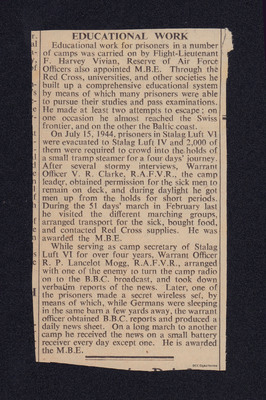Educational work
Title
Educational work
Description
Article. States that educational work for prisoners in a number of camps was carried out by Flight Lieutenant F Harvey Vivian RAFVR also appointed MBE. Mentions he made two attempts to escape and describes evacuation of Stalag Luft VI by ship and then their 51 day march. Mentions work done on ship by Warrant Officer V R Clarke. Mentions camp secretary of Stalag Luft VI, Warrant Officer R P Lancelot Mogg who persuaded Germans to allow him to listen to radio and take verbatim reports of BBC war news.
Coverage
Language
Type
Format
One newspaper cutting
Publisher
Rights
This content is available under a CC BY-NC 4.0 International license (Creative Commons Attribution-NonCommercial 4.0). It has been published ‘as is’ and may contain inaccuracies or culturally inappropriate references that do not necessarily reflect the official policy or position of the University of Lincoln or the International Bomber Command Centre. For more information, visit https://creativecommons.org/licenses/by-nc/4.0/ and https://ibccdigitalarchive.lincoln.ac.uk/omeka/legal.
Contributor
Identifier
SValentineJRM1251404v10128
Transcription
EDUCATIONAL WORK
Educational work for prisoners in a number of camps was carried on by Flight-Lieutenant F. Harvey Vivian, Reserve of Air Force Officers also appointed M.B.E. Through the Red Cross universities and other societies he built up a comprehensive educational system by means of which many prisoners were able to pursue their studies and pass examinations. He made at least two attempts to escape; on one occasion he almost reached the Swiss frontier, and on the other the Baltic coast.
On July 15, 1944, prisoners in Stalag Luft VI were evacuated to Stalag Luft IV and 2,000 of them were required to crowd into the holds of a small tramp steamer for a four days’ journey. After several stormy interviews, Warrant Officer V. R. Clarke, R.A.F.V.R., the camp leader, obtained permission for the sick men to remain on deck, and during daylight he got men up from the holds for short periods. During the 51 days’ march in February last he visited the different marching groups, arranged transport for the sick, bought food, and contacted Red Cross supplies. He was awarded the M.B.E.
While serving as camp secretary of Stalag Luft VI for over four years, Warrant Officer R.P. Lancelot Mogg, R.A.F.V.R., arranged with one of the enemy to turn the camp radio on to the B.B.C. broadcast, and took down verbatim reports of the news. Later, one of the prisoners made a secret wireless set, by means of which, while Germans were sleeping in the same barn a few yards away, the warrant officer obtained B.B. C. reports and produced a daily news sheer. On a long march to another camp he received the news on a small battery receiver every day except one. He is awarded the M.B.E.
Educational work for prisoners in a number of camps was carried on by Flight-Lieutenant F. Harvey Vivian, Reserve of Air Force Officers also appointed M.B.E. Through the Red Cross universities and other societies he built up a comprehensive educational system by means of which many prisoners were able to pursue their studies and pass examinations. He made at least two attempts to escape; on one occasion he almost reached the Swiss frontier, and on the other the Baltic coast.
On July 15, 1944, prisoners in Stalag Luft VI were evacuated to Stalag Luft IV and 2,000 of them were required to crowd into the holds of a small tramp steamer for a four days’ journey. After several stormy interviews, Warrant Officer V. R. Clarke, R.A.F.V.R., the camp leader, obtained permission for the sick men to remain on deck, and during daylight he got men up from the holds for short periods. During the 51 days’ march in February last he visited the different marching groups, arranged transport for the sick, bought food, and contacted Red Cross supplies. He was awarded the M.B.E.
While serving as camp secretary of Stalag Luft VI for over four years, Warrant Officer R.P. Lancelot Mogg, R.A.F.V.R., arranged with one of the enemy to turn the camp radio on to the B.B.C. broadcast, and took down verbatim reports of the news. Later, one of the prisoners made a secret wireless set, by means of which, while Germans were sleeping in the same barn a few yards away, the warrant officer obtained B.B. C. reports and produced a daily news sheer. On a long march to another camp he received the news on a small battery receiver every day except one. He is awarded the M.B.E.
Citation
“Educational work,” IBCC Digital Archive, accessed November 5, 2024, https://ibccdigitalarchive.lincoln.ac.uk/omeka/collections/document/22171.
Item Relations
This item has no relations.

